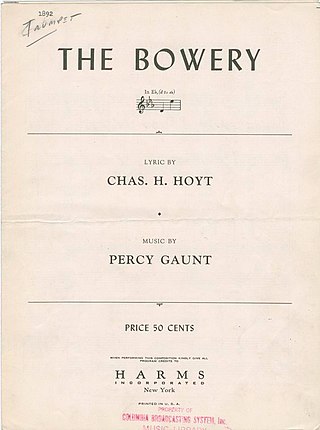Loading AI tools
From Wikipedia, the free encyclopedia
"The Bowery" is a song from the musical A Trip to Chinatown with music by Percy Gaunt and lyrics by Charles H. Hoyt. The musical toured the country for several years and then opened on Broadway in 1891.[1]

The song is written in 3/4 time in a major key. The lyrics describe an incident in New York City and have nothing to do with the plot, a story set in San Francisco.[2] They consist of six verses interspersed with the chorus, which ends with the vow:
The Bowery, the Bowery,
I'll never go there anymore!
Although the Bowery neighbourhood of New York City was where theater life flourished from about 1860 to 1875, by the 1880s it had become a sordid district.[3] The experience of the singer is described in part by the Village Voice:[4]
He's [the singer] buttonholed by a grifter and conned by a shopkeeper before entering "a concert hall," where he starts a row because he thinks "A New Coon in Town" is directed at him. Bye-bye rube: "A man called a bouncer attended to me./I'll never go there any more."
|
The Bowery[2] Verse 1 |

The producer/playwright/lyricist Charles H. Hoyt (1849–1900) collaborated on at least 11 musicals with conductor/composer Percy Gaunt (1852–1896).[5] Hoyt, who has been called the Father of American Farce,[6] developed a style in his musicals based upon fast action, outrageous situations, witty dialogue, dancing, acrobatics, and singing. The meager plot of A Trip to Chinatown did not remain constant during its long run but varied with changes in novelty acts, songs, characters, and lines.[6] One constant was The Bowery, which had been interpolated initially to shore up the musical's appeal.[7] The strategy proved successful, and The Bowery became a major factor in the show's success.[7] It was introduced on Broadway by comic Harry Conor.[7] A Trip to Chinatown ran for 650 performances and set a Broadway record that stood for 20 years.[6] The Bowery sold more than 1 million copies of sheet music and has remained a familiar song.[8]
Bing Crosby included the song in a medley on his album Join Bing and Sing Along (1959).
Seamless Wikipedia browsing. On steroids.
Every time you click a link to Wikipedia, Wiktionary or Wikiquote in your browser's search results, it will show the modern Wikiwand interface.
Wikiwand extension is a five stars, simple, with minimum permission required to keep your browsing private, safe and transparent.